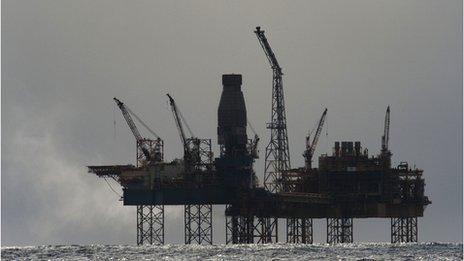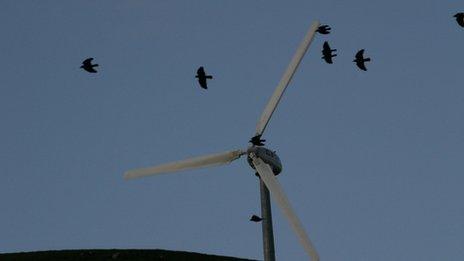Scottish independence: energy's alternating currents
- Published

Four trillion pounds: the possible value of oil and gas under Scottish waters. That's four thousand billion. It was a tantalising prospect of a lot of lucre looking out from the front of a Sunday paper this past weekend, potentially transforming the debate on Scotland's economic future.
Behind it is a projection of the oil price going as high as $270 per barrel, from the just over $100 it is trading at now.
What the report did not tell you was that it was the top end of a very wide spread of possible prices.
It assumes the top end of projections for oil still available for extraction. Most of that would be money going to multi-national owners of those reserves.
And the number tells you nothing about the impact on the rest of the economy from such an increase in fuel prices, both at home and in export markets. You can reasonably assume that it wouldn't be pretty.
Upsides and downsides
But it helps focus minds on the energy bit of the independence debate.
The figure is drawn from the Organisation of Economic Co-operation and Development, on which I reported in March.
The reference is now included in one of several papers written for the David Hume Institute (DHI) in Edinburgh, external, which today holds a conference on the big issue of energy in an independent Scotland, from the point of view of oil and gas, of renewables, and of the consumer.
What runs through them all are wide variations of risk and return, revolving around a range of uncertainties, some of which are well established in the independence debate, some of which are new, and many of which gain from intelligent illumination.
As the authors of the 'Energy Trends: Scotland and the World', Julian Fennema, Mark Schaffer and Karen Turner, three economists at Heriot-Watt University, summarise it: "If world oil prices go up and stay high, or there are major new discoveries in Scotland, there will be a big payoff for an independent Scotland and a payoff for the UK as a whole if Scotland is still part of the Union; if there is a fall in oil prices, or little in the way of new discoveries, an independent Scotland absorbs the full downside, unlike the case where it is still part of the Union."
That much is sort of obvious, when you think about it. The questions on the energy question, which is never far from the economic part of the independence debate, are how you assess both risk and return, and how much appetite for risk - both downside and upside - Scottish voters will have when they vote in September next year.
Supply chain
Another of the DHI papers on oil and gas, written by John Paterson and Greg Gordon of Aberdeen University, underlines the uncertainties that the move to independence could introduce to a sensitive investment market.
To watch the rate at which pounds, dollars, euros, Chinese renminbi and Korean won are being drilled into the North Sea and West of Shetland, you wouldn't think there's much concern about constitutional change.
Investment in UK oil and gas reached a heady £11.4bn last year, and is on track for £13bn this year. These companies are used to working across international boundaries, and multiple tax regimes.
Indeed, it's worth a brief digression to underline the findings of the latest survey of Scotland's offshore services industry, published at the weekend by the Scottish government.
It found 2011 supply chain earnings hit £17.2bn, up 5.8%, and continuing 14 years of growth. Nearly half of that was in exports, up 8.4% to £8.2bn.
While selling to 106 different countries, the biggest market remained North America, but with Africa in a strongly-growing second place, and sales of expertise to the Middle East on the rise as well.
While investment in UK water is back in boom times, the offshore industry in and around Aberdeen appears to be doing exceptionally well at diversifying into foreign markets.
Maritime boundaries
However, the authors of the DHI's academic paper say the independence debate is "an unwelcome note of uncertainty for the oil and gas industry", at a time when it thinks it has finally got an understanding in Whitehall of the need for tax and regulatory predictability.
It's not that independence would necessarily upset the applecart, as the Scottish government, headed by an oil economist, appears to be alert to the industry's need for consistency. But the academics offer some pointers to issues other than tax - notably including Scotland's maritime boundaries - that could leave uncertainty hanging in the air:
"International law provides procedures for resolving this issue rather than a clear answer," they write. "Negotiation could be protracted. Any reference to a dispute resolution mechanism could delay a final answer for years."
The authors suggest that joint development between Scotland and the rest of the UK could help to keep the industry's momentum during that time.
Messrs Paterson and Gordon also raise concerns that the transfer from Whitehall to Scotland of regulation, licensing, inspection and safety is a major undertaking, particularly in a mature region for oil and gas, with ageing equipment, hard-to-reach reserves and a looming boom in decommissioning.
And there's a warning to both London and Edinburgh politicians: while the public finances are in a lot of trouble, "The temptation to regard the industry as a cash-cow to meet short-term needs will be strong, but should be resisted".

Cross-border cables
Today's energy conference is also looking at the other side of a sector that holds strong prospects for the Scottish economy - in renewables.
Grant Allan, Peter McGregor and Kim Swales, of Strathclyde University, tackle the question of whether independence would help Scotland's big ambitions for green energy. Or could it hold them back?
This has been a sensitive one, since the pro-union campaign raised the prospect of huge increases in Scottish bills if Scots can no longer look to English, Welsh and Northern Irish bill-payers to share the cost of the subsidies necessary to incentivise wind farm developers.
The academics acknowledge that argument, though in less alarmist tones than the headlines.
They look at the obligation on all countries to use more green power, at the baseload supply for those times when the wind drops and waves subside, and at the choices that the rest of the UK (rUK) would face if there were a disruption down the line in Britain's integrated energy market.
With conventional thermal power stations already being switched off and lots more capacity soon to go, wind and marine turbines are seen as the future, and it makes sense to locate them where they can generate most efficiently.
That can often mean Scotland, which could continue to sell power to its southern neighbour, post-independence.
That would be helped by the current plans for better grid links between Scotland and England, even if these cables cross an international boundary.
"However, it is not entirely clear how a completely integrated market could be maintained under independence," say the Strathclyde economists. "Overall, it seems likely that security of supply will prove a greater challenge for Scotland as an independent nation than for Scotland as an integral part of the UK".
Security of supply
Just one of the problems is how to ensure baseload supply, for which Scotland could be forced to look south.
It's argued that it makes no sense for Scotland to provide all its own back-up to wind and marine power, particularly if it's also put a block on new nuclear plants.
The costs of building its own spare capacity would be "very substantial" and "extraordinarily inefficient".
The authors go on: "It is clear that an independent Scotland would likely have to depend, for periods at least, on imports of electricity or fuels from rUK and elsewhere to ensure security of supply."
They then point out that the rUK could be expected to prioritise its own need to keep the lights on, in times of shortage, leaving Scotland at the end of the line and at a disadvantage.
Behind that is the UK's binding European Union obligation to cut emissions. It can do that by buying into the Scottish government's ambitious targets, drawing green power from north of the Tweed with or without independence.
But if there's to be an independent Scotland, rUK could choose to fulfil those obligations by buying green power from Ireland or from the continent, or by building more turbines on its own turf and seabed. That would be a big problem for Scottish policy-makers, the academics conclude.
Independence offers up the opportunity to use different policy levers, they point out; to tax carbon emissions more heavily, for instance, or to use inward investment to accelerate the economic benefits of green energy.
But for each opportunity, a potential downside: "It seems likely that, in the long-run, there will be costs in the form of higher electricity charges for Scottish consumers relative to those in the rUK".
It's a provocative point at which the David Hume Institute can start its discussions. And it puts down a challenge to Alex Salmond, when he delivers a speech later this week on the past, present and future of renewable power in Scotland.
- Published1 May 2013
